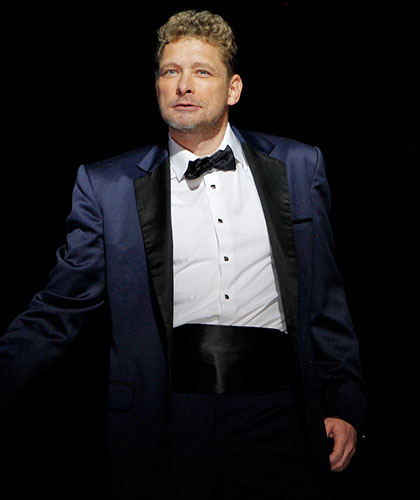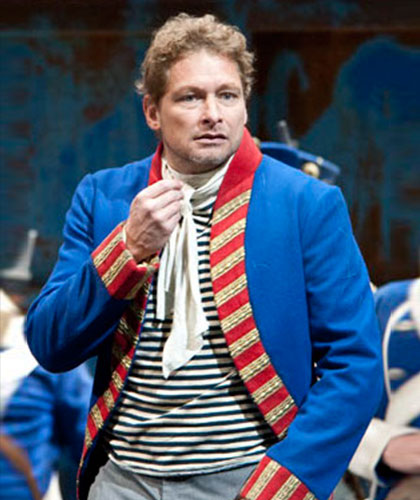


Bass-Baritone, Carsten Wittmoser, was born in Essen, Germany. Mr. Wittmoser graduated in economics at the University of Essen and studied voice privately with Hendrikus Rootering. Carsten Wittmoser began his career at the State Opera of Stuttgart, Germany. After completing his studies, the bass-baritone became a principal soloist of the Staatstheater Stuttgart, after which came engagements with the Landestheater Linz, the Opera of Freiburg and the Hamburgische Staatsoper. Since 2008 he is freelancing. Mr. Wittmoser has worked in prestigious opera houses all over the world, such as State Opera Berlin, Deutsche Oper Berlin, Komische Oper Berlin, State Opera Munich, Teatro Real de Madrid, Monte Carlo Opera, Seattle Opera House, Detroit Opera House, Opera de Bogota, Opera de Bellas Artes Mexico City and recently at the Metropolitan Opera House.

Carsten Wittmoser has performed at the Festivals of Bayreuth, Luzern, the Gergiev Festival in Rotterdam, the Bard Summercape in New York, Taiwan and Singapore. The bass-baritone has sung in some of the most important concert halls, such as the Musikverein in Vienna, The Sao Paulo Concert Hall, the Herkulessaal in Munich, the Brucknerhaus in Linz, the KKL in Luzern and the Carnegie Hall in New York. Mr. Wittmoser has worked with Christian Thielemann, Valery Gergiev, Mariss Jansons, Michael Boder, Simone Young, Ton Koopman, Pinchas Steinberg, Paavo Järvi, Semyon Bychkov, Sebastian Weigle, Dennis Russel Davies and James Levine.

Mr. Wittmoser´s repertoire includes bass and bass-baritone roles, such as Rocco and Pizarro in Fidelio, Don Basilio in Il barbiere di Seviglia, Escamillo in Carmen, Scarpia in Tosca, the Villains in Tales of Hoffmann and the title role in Der fliegende Holländer.
In 2016 Carsten Wittmoser made his debut at the Metropolitan Opera New York singing Kurwenal in Tristan and Isolde under the batton of Sir Simon Rattle. Recently he sang his first Rheingold Wotan with the Transylvanian State Philharmonic Orchestra in Rumania.
In Mexico he sang Rocco in Fidelio, Lord Sidney in Viaggio a Reims and Don Basilio in Barber of Sevil at Ópera de Bellas Artes in Mexico City. He sang concerts with the best orchestras of Mexico, like Rossini ´s Stabat Mater, Dovrak´s Stabat Mater, Verdi Requiem, Brahms Requiem, Beethoven ´s ninth symphony amongst others. He lately appeared at opern air-concerts in front of 15000 people with Beethoven ´s ninth symphony and Verdi ´s Requiem.
He recently returned to Palacio de Bellas Artes in Mexico City to sing Rocco in Fidelio. His next project will be his debut at ABAO Bilbao Opera, singing Simone in Zemlinsky´s "Eine florentinische Tragödie"
In August 2022 he sang five concerts of Beethoven`s ninth symphony with Orquesta Sinfónica de Mineria under the batton of Carlos Miguel Prieto and in November he will sing three concerts of Verdi ´s Requiem with Orquesta Filarmónica de la Ciudad de México under the batton of Scott Yoo.
This March he is going to return to Carnegie Hall for the forth time in order to interpret Schönberg´s Gurrelieder alongside the American Symphony Orchestra under the batton of Leon Botstein.
Carsten Wittmoser, a tall, striking looking bass-baritone, fit the role of Jupiter, the god of Lotharios, to a tee. His burnished and virile voice had the tinge of arrogance and egotism that suited the role.
Carsten Wittmoser is as evil and nasty as villains get – that is meant with the highest compliment, as he uses his powerful bass to spew hate and fear in the prison and at the audience most effectively.
In the title role Carsten Wittmoser left a deep, lasting impression with his well placed, incisive baritone. He was able to create impressive arches with his singing. Especially notable is his perfect diction.
What a difference with Carsten Wittmoser (Peter, the father) who presented us a gala of affection, diction and volume. He was neither to green nor to old and by far the only one of the cast who presented himself as an actor and vocally at the peak of his artistry.
Carsten Wittmoser gave us the great joy to let his voice slide through all the registration of Basilio and let it explode at the proper place.
With Carsten Wittmoser singing the Simone he had a Protagonist who determined from the very beginning the evening with never ceasing emphasis and a striking and rich baritone voice with perfect diction.

OPERA:
Beethoven:
Fidelio: Rocco, Pizarro
Leonore: Pizarro
Berg:
Wozzeck: Wozzeck*
Lulu: Dr. Schön*, Tierbändiger/Athlet
Bizet:
Carmen: Escamillo
Boito:
Mefistofele: Mefistofele*
Britten:
Billy Budd: Ratcliff
Peter Grimes: Balstrode*
Hindemith:
Mathis der Maler: Mathis*
Humperdink:
Hänsel und Gretel, Peter Besenbinder
Gounod:
Faust: Mephistopheles*
Mozart:
Don Giovanni: Don Giovanni*, Leporello
Le Nozze di Figaro: Figaro*
Die Zauberflöte: Sprecher
Cosi fan tutte: Don Alfonso
Nozze di Figaro: Figaro*, Conte
(* signifies role in preparation)

Offenbach:
The Tales of Hoffmann: Lindorf, Coppelius, Miracle, Dapertutto,
Orff:
Der Mond: Petrus
Rossini:
Il Viaggio a Reims: Lord Sidney
Barbiere: Don Basilio
Strauss:
Elektra: Orestes*
Die Liebe der Danae: Jupiter
Salome: Jochanaan*, 1. Nazarener
Verdi:
Aida: Amonasro
Rigoletto: Monterone
Macbeth Banquo: Macbeth*
Otello: Jago*
Wagner:
Der fliegende Holländer: Holländer
Tannhäuser: Landgraf
Tristan und Isolde: Kurwenal
Das Rheingold: Wotan
Siegfried: Der Wanderer*
Walküre: Wotan*
Lohengrin: Telramund*, Heerrufer*
Weber:
Der Freischütz: Kaspar*
Zemlinsky:
Eine florentinische Tragödie: Simone

CONCERT:
Bach:
Johannes-Passion Jesus
Matthäus-Passion: Arien und Rezitative
Weihnachtsoratorium 1-3, 5, 6
Beethoven:
9. Sinfonie
Berlioz:
Damnation de Faust, Brandner
Brahms:
Requiem
Bruckner:
Te deum
Dvorak:
Stabat Mater
Händel:
Belsazar, Gobrias
Haydn:
Paukenmesse
Nelsonmesse
Die Schöpfung
Mendelssohn:
Lauda Sion
Mozart:
Requiem
Krönungsmesse
Spatzenmesse
Regina Coeli
C-moll Messe
Puccini:
Missa di Gloria
Petite Messe solenelle
Schubert:
As dur
Verdi:
Requiem
Zemlinsky:
Eine lyrische Sinfonie
Privacy Policy Site managed by conacento .